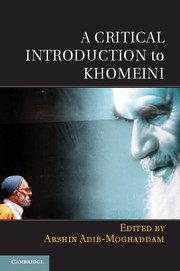Book contents
- Frontmatter
- Contents
- List of Map and Figures
- About the Authors
- Acknowledgments
- Glossary
- Timeline: The Life of Ayatollah Ruhollah Khomeini (1902–1989)
- Introduction Ayatollah Ruhollah Khomeini: A Clerical Revolutionary?
- 1 Khomeini and the “White Revolution”
- 2 The Rise of Khomeinism
- 3 Wilayat al-Faqih and the Meaning of Islamic Government
- 4 Ayatollah Khomeini’s Rule of the Guardian Jurist
- 5 Khatt-e Imam
- 6 Khomeini and the West
- 7 Gendered Khomeini
- 8 Hidden Khomeini
- 9 The Divine, the People, and the Faqih
- 10 Khomeini’s Legacy on Women’s Rights and Roles in the Islamic Republic of Iran
- 11 To Rule, or Not to Rule? An Alternative Look at the Political Life of Ayatollah Khomeini between 1960 and 1980
- 12 Khomeini and the Decolonization of the Political
- 13 Contentious Legacies of the Ayatollah
- Further Reading
- Index
- References
2 - The Rise of Khomeinism
Problematizing the Politics of Resistance in Pre-Revolutionary Iran
Published online by Cambridge University Press: 05 June 2014
- Frontmatter
- Contents
- List of Map and Figures
- About the Authors
- Acknowledgments
- Glossary
- Timeline: The Life of Ayatollah Ruhollah Khomeini (1902–1989)
- Introduction Ayatollah Ruhollah Khomeini: A Clerical Revolutionary?
- 1 Khomeini and the “White Revolution”
- 2 The Rise of Khomeinism
- 3 Wilayat al-Faqih and the Meaning of Islamic Government
- 4 Ayatollah Khomeini’s Rule of the Guardian Jurist
- 5 Khatt-e Imam
- 6 Khomeini and the West
- 7 Gendered Khomeini
- 8 Hidden Khomeini
- 9 The Divine, the People, and the Faqih
- 10 Khomeini’s Legacy on Women’s Rights and Roles in the Islamic Republic of Iran
- 11 To Rule, or Not to Rule? An Alternative Look at the Political Life of Ayatollah Khomeini between 1960 and 1980
- 12 Khomeini and the Decolonization of the Political
- 13 Contentious Legacies of the Ayatollah
- Further Reading
- Index
- References
Summary
Introduction
Ayatollah Khomeini’s thinking was in the making for almost half a century. His views evolved over five distinct stages, beginning with political quietism and concluding with political absolutism. To be more precise, Khomeini’s political life can be structured along five individual and interrelated signposts: Khomeini as the quietist (1920s–1940s); the constitutionalist (1940s–1971); the revolutionary (1971–1979); the vali-ye faqih (1979–1987); and the absolute vali-ye faqih (1987–1989). The young Khomeini’s attitude to politics was congruent with the long-established tradition of political quietism and social conservatism of the clerical institution. Khomeini’s transition from quietism to constitutionalism was prompted by the fear of secularism undermining the traditional role of the ulema in society. During this period, as long as the shariah was enforced, the form of government was of little concern to Khomeini. However, Khomeini began to change his position in the 1970s. His theory of velayat-e faqih (“guardianship of the jurist”) was a point of departure from constitutionalism to radicalism. According to the radical and revolutionary Khomeini, the institution of monarchy was illegitimate, and only an Islamic government bore the right to rule a Muslim population. He successfully transformed the last monarchy into Iran’s first republic, institutionalizing his theory of velayat-e faqih and turning from revolutionary into vali-ye faqih and later absolute (motlaqeh) vali-ye faqih.
- Type
- Chapter
- Information
- A Critical Introduction to Khomeini , pp. 43 - 68Publisher: Cambridge University PressPrint publication year: 2014
References
- 14
- Cited by



